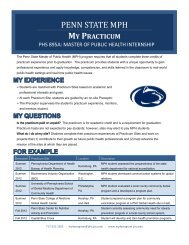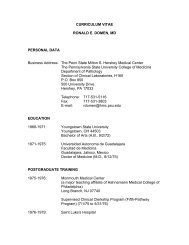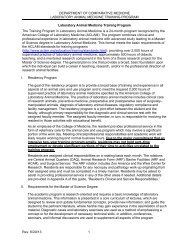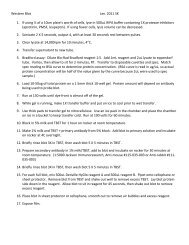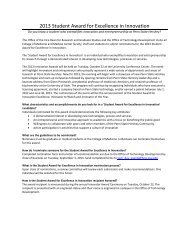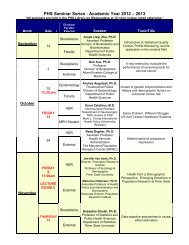Penn State Graduate Student Career Guide - Biomedical Sciences ...
Penn State Graduate Student Career Guide - Biomedical Sciences ...
Penn State Graduate Student Career Guide - Biomedical Sciences ...
Create successful ePaper yourself
Turn your PDF publications into a flip-book with our unique Google optimized e-Paper software.
46 CONSIDERING AND ACCEPTING JOBS OFFERS<br />
<strong>Penn</strong> <strong>State</strong> Grad <strong>Student</strong> <strong>Career</strong> <strong>Guide</strong><br />
2011<br />
2012<br />
Job Offers and Acceptances<br />
Negotiating Job Offers and Compensation Packages<br />
<strong>Student</strong>s who are entering the job market<br />
often find that negotiating job offers<br />
is the most difficult and stressful part<br />
of the job acquisition process (at least<br />
a close second to the job interview).<br />
Our experience is that graduates find<br />
the process difficult for a few common<br />
reasons. First, they may feel tense and<br />
nervous about engaging in a competitive<br />
interaction with a potential employer.<br />
Second, they don’t want to offend the<br />
employer and potentially have the<br />
employer rescind the job offer (this<br />
rarely ever happens). Lastly, they don’t<br />
have the knowledge and information<br />
necessary to confidently engage in the<br />
negotiation process. To help you with<br />
overcoming some of these common<br />
perceptions and obstacles, we have provided<br />
you with a few useful strategies.<br />
Adopt a Win/Win Mindset<br />
When it comes time to negotiate offers<br />
with potential employers, it is important<br />
that you develop a win/win orientation.<br />
The ultimate goal is to achieve an<br />
outcome that is pleasing to both you<br />
and your employer. The goal of your<br />
potential employer is to gain a valuable<br />
new employee who will add value<br />
to their organization at a “reasonable”<br />
cost. Your goal is to gain employment<br />
with a desirable company where you can<br />
add value and be fairly compensated for<br />
your talents and efforts. Okay, so these<br />
goals are not all that different right? It<br />
is our belief that if you approach your<br />
negotiation with the attitude that you<br />
want both teams to get something out of<br />
the interaction, and that it’s not an issue<br />
of “I win if they lose” (or visa versa),<br />
then you are in the right frame of mind<br />
for moving forward.<br />
Negotiation Is Not a Bad Word<br />
Life is about compromise and negotiation.<br />
You do it unconsciously every time<br />
you bargain with your friends about<br />
whether to go out for pizza or burgers,<br />
go to the pool or to the pool hall. The<br />
point is that you need to express yourself<br />
in a persuasive way that accurately<br />
and informatively communicates your<br />
wants/needs without offending the other<br />
party. In most cases, employers expect<br />
some degree of negotiation. Recruiters<br />
are well trained in the art of negotiation<br />
and they deal with it on a daily<br />
basis. It’s not the fact that you decide<br />
to negotiate that irritates potential<br />
employers, it’s the manner in which you<br />
negotiate that can make the difference<br />
between a satisfied employer and an<br />
irritated employer. As with any interaction,<br />
be respectful, understand that you<br />
may have to give a little to get a little<br />
(remember win/win), and always express<br />
appreciation that you have received an<br />
offer of a job.<br />
Timing Is Key<br />
It may seem like it’s common knowledge,<br />
but people still make the mistake<br />
of talking money and benefits too soon<br />
in the process. The time for negotiation<br />
occurs at the point that you have<br />
been extended an offer of employment,<br />
no sooner. Conversations about money,<br />
benefits, and other potential perks<br />
should wait until after it’s clear that they<br />
want you as an employee. Prior to this<br />
point, the focus should be on explaining<br />
how you can add value to their organization<br />
and on obtaining information about<br />
the specifics of the actual job and the<br />
organization. The company should get<br />
the impression that your primary focus<br />
is on your investment in their organization...the<br />
money will follow.<br />
Do Your Research<br />
You stand a better chance of having<br />
a successful salary negotiation if you<br />
present a well-reasoned position that<br />
is backed up by data and compelling<br />
information. The pieces of information<br />
that are potentially useful to you are<br />
the average salary of employees in your<br />
occupational area, the salary adjustments<br />
that occur due to geography,<br />
typical salaries earned by graduates of<br />
your same program, and typical salaries<br />
earned by someone with your level of<br />
education, background and skill. There<br />
are many resources on the Internet and<br />
in the <strong>Career</strong> Information Center that<br />
can provide you with useful salary information.<br />
A few of the more useful websites<br />
for salary information are:




